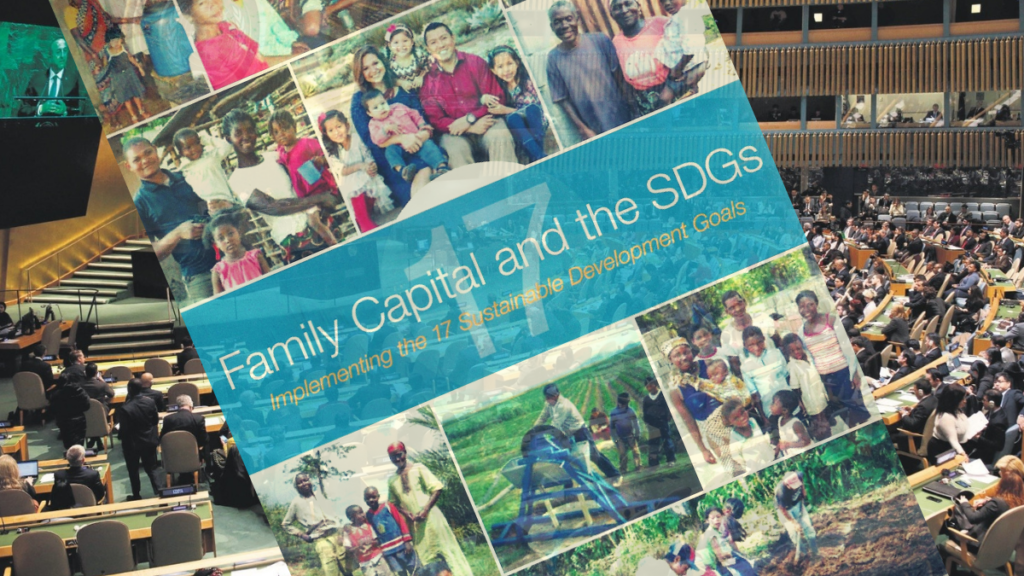With the observance on 17 October 2020 of the 27th annual International Day for the Eradication of Poverty during the COVID-19 pandemic that continues to ravage the human race, never has there been such urgency to alleviate the heart-wrenching plague of poverty afflicting so many of our brothers and sisters throughout the world. While the International Organization for the Family applauds the Herculean efforts already in progress by the United Nations, governments, and civil society, we also believe that the ambitious first goal of the Sustainable Development Goals—“End poverty in all its forms everywhere”—can never be achieved without strengthening and protecting the indispensable foundation for all sustainable development: the family.
It was on the occasion of the 10th anniversary of the International Year of the Family that Secretary-General Kofi Annan declared to the General Assembly, “Concern for the well-being of families dates back to the earliest days of the United Nations…. This anniversary is an opportunity to reaffirm the importance and centrality of the family…. Governments need to do more to help families adapt and thrive…. We must not forget that the family is a vital partner in efforts to achieve the Millennium Development Goals and the many other objectives set by the international community during the last decade.”
To say that concern for families “dates back to the earliest days of the United Nations” is to refer to what the 1948 Universal Declaration of Human Rights acknowledged as it identified the only group unit possessing human rights: “The family is the natural and fundamental group unit of society and is entitled to protection by society and the State” (UDHR 16(3)). In that “precise and elegant” language, observed the late Professor Richard Wilkins, the word natural signals that “the family is not merely a construct of human will or imagination” but “has a profoundly important connection to nature” which “begins with the realities of reproduction and extends to the forces that shape civilization itself” based on “the natural union of a man and a woman.”
Pope Francis called it “the complementarity between man and woman,” which “lies at the foundation of marriage and the family” and provides “a unique, natural, fundamental and beautiful good for people, families, communities and societies.” And departure therefrom can only bring disaster, the Pope warned: “It is ever more evident that the decline of the culture of marriage is associated with increased poverty and a host of other social ills that disproportionately affect women, children and the elderly.”
What Mexico’s Ana Teresa Aranda said of her society is increasingly descriptive of society everywhere. “It is no secret that the vulnerability suffered by our peoples—insecurity, crime, abuse, abandonment of the elderly, orphaned children and violence—causes enormous imbalances and obliges us to spend millions on institutional policies that in the end can do no more than manage those ills. If we go on like this, a time will come when all our tax resources will not suffice to counter the effects of vulnerability. If we wish to address the causes, we must look at the family.”
To end poverty, we must indeed begin by looking to the family. At the same 10th anniversary at which Kofi Annan spoke of the family, Bangladesh Ambassador Iftekhar Chowdhury stated, “The attainment of every Millennium Development Goal must begin with the family. The family is the main instrument of societal transformation.” To encourage recognition of the family as the instrument of societal transformation, we offer our acclaimed book Family Capital and the SDGs, which has been widely distributed to UN missions and has repeatedly been on display as a featured title in the Dag Hammarskjöld Library. The book is also available for online viewing and free download at https://familycapital17sdgs.org.
As policymakers proceed to battle the heart-wrenching plague of poverty, we urge that family be expressly placed at the center of all plans and implementation. The words of her Highness Sheikha Moza bint Nasser of Qatar stand as a signpost to success: “The family is the driving force behind social progress and development.”
